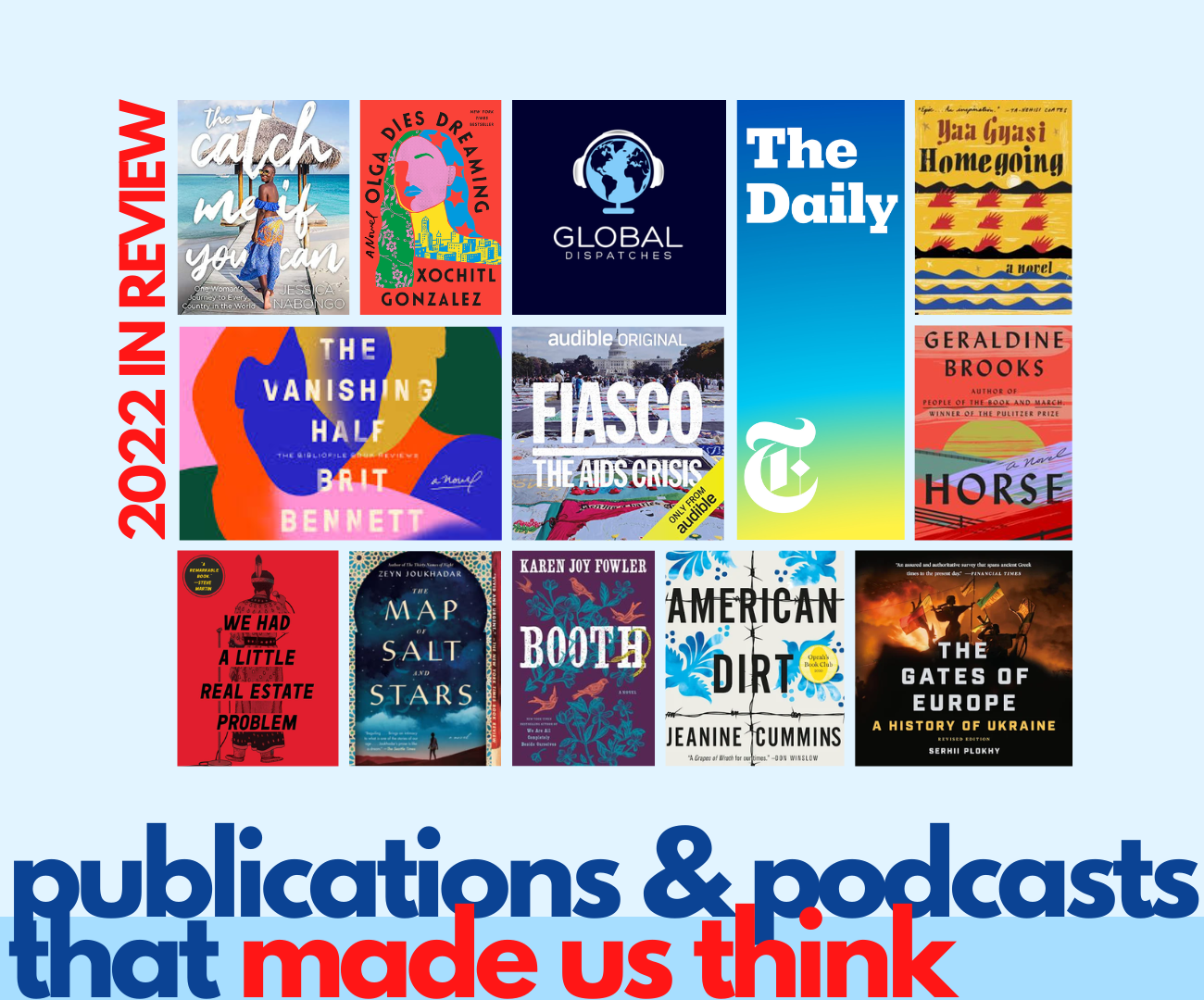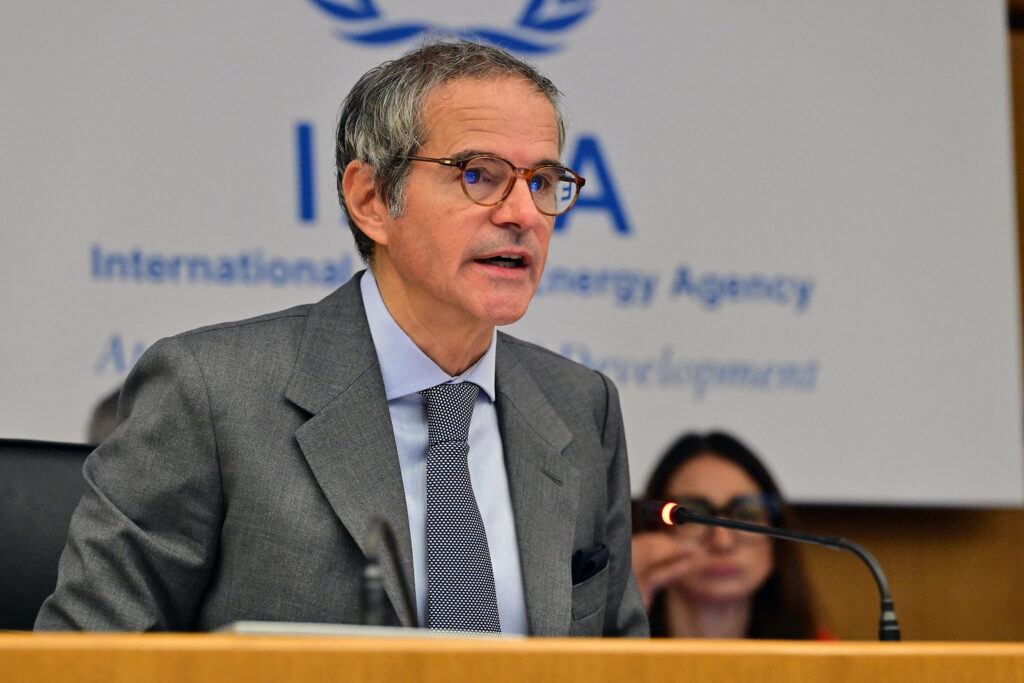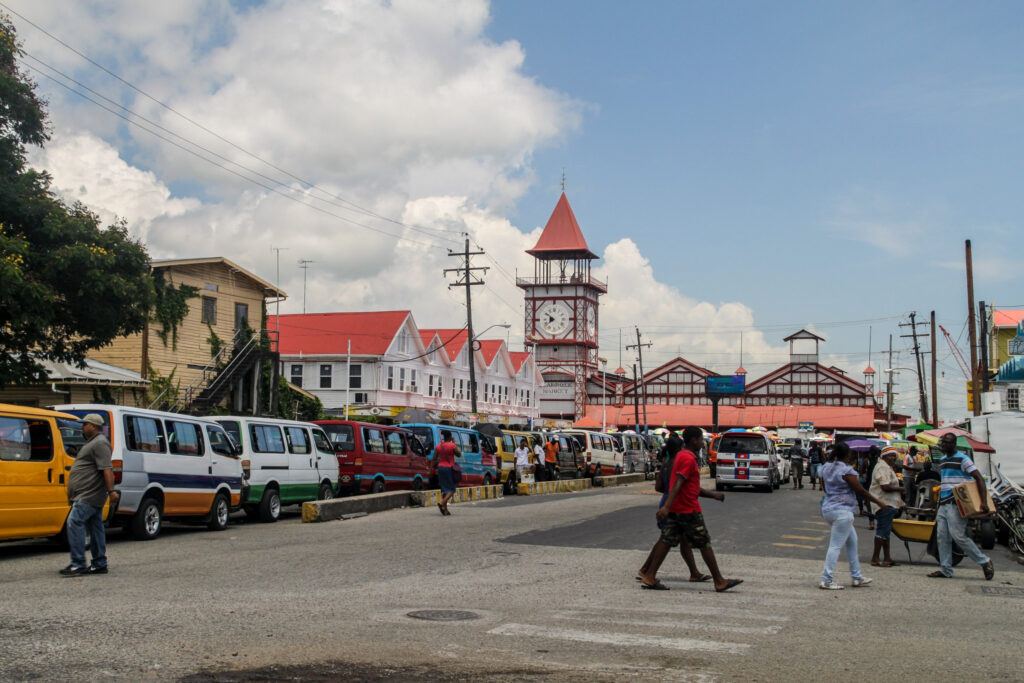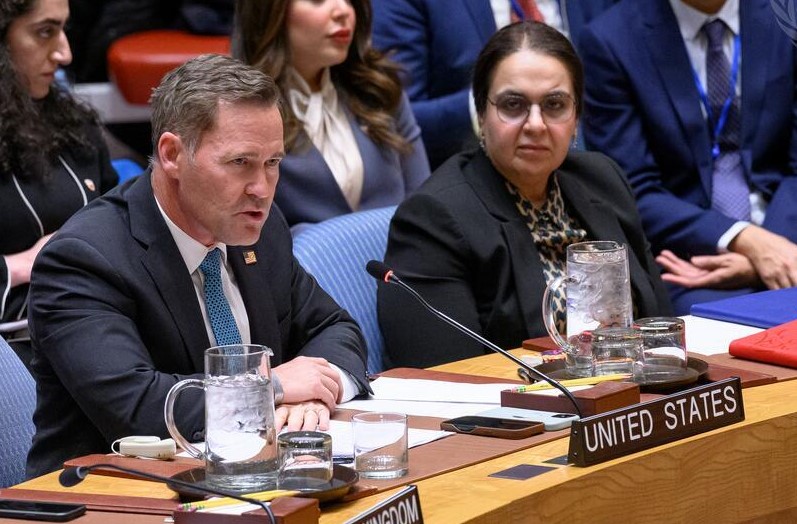As you can imagine, an organization dedicated to advancing global security, health, and equity requires a team in the know of a little bit of everything. From memoirs and mysteries to fiction and world affairs, we’re a staff who takes our learning seriously. So this year, we asked the UN Foundation family to share some of their most memorable reads from 2022 that we’re still noodling on – books that challenged perceptions of identity, history, and truth.
Here are the top 12 recommendations (with an extra suggestion for daily listening) to help you plan your monthly mental flexing for 2023.
Credit to publishers for descriptions.
American Dirt | Jeanine Cummins
Lydia lives in Acapulco with her son and husband, a journalist. And while cracks are beginning to show in Acapulco because of the cartels, Lydia’s life is, by and large, fairly comfortable. But after her husband’s tell-all profile of the newest drug lord is published, none of their lives will ever be the same. Forced to flee, Lydia and Luca find themselves joining the countless people trying to reach the United States.
Booth | Karen Joy Fowler
In 1822, the Booth family moved into a secret cabin thirty miles northeast of Baltimore to cement their place as one of the country’s leading theatrical families. Behind the curtains of the many stages they graced, however, scandals, family triumphs, and criminal disasters took their toll, and the siblings of John Wilkes Booth had to reckon with the truth behind the destructively specious promise of an early prophecy. Booth is a portrait of a country in the throes of change and a vivid exploration of the ties that make and break a family.
The Catch Me If You Can | Jessica Nabongo
In 2019, Jessica Nabongo completed her journey to all 195 UN-recognized countries in the world. In her one-of-a-kind memoir, she documents her remarkable experiences in each country, including a harrowing scooter accident in Nauru, learning to make traditional octopus balls in Japan, dog sledding in Norway, swimming with humpback whales in Tonga, and a late night adventure with strangers to cross a border in Guinea Bissau. Nabongo’s stories are love letters to diversity, beauty, and culture ― and most of all, to the people she meets along the way.
Fiasco: The AIDS Crisis (podcast)
The hit series Fiasco offers one of the most in-depth, gripping accounts of the AIDS crisis in America, told with an emphasis on the moments of uncertainty, confusion, and acrimony that made the epidemic so deadly. On the heels of the COVID-19 pandemic, the parallels and opportunities are striking.
The Gates of Europe | Serhii Plokhy, Ralph Lister, et al.
Situated between Central Europe, Russia, and the Middle East, Ukraine was shaped by the empires that used it as a strategic gateway between East and West — from the Roman and Ottoman empires to the Third Reich and the Soviet Union. The mixing of peoples and religions on the steppe borderland produced the class of ferocious Cossack warriors, while the encounter between the Catholic and Orthodox churches created a religious tradition that bridges Western and Eastern Christianity. Examining the history of Ukraine’s search for identity, The Gates of Europe provides insight into the origins of the most dangerous international crisis since the end of the Cold War.
Global Dispatches (podcast)
Named by the Guardian as one of 27 “podcasts to make you smarter,” Global Dispatches is a global affairs podcast with impact. Episodes shine a spotlight on global issues and listeners leave each episode informed, inspired and more deeply engaged in the world around them.
Homegoing | Yaa Gyasi
The unforgettable New York Times bestseller begins with the story of two half-sisters, separated by forces beyond their control: one sold into slavery, the other married to a British slaver. Written with tremendous sweep and power, Homegoing traces the generations of family who follow, as their destinies lead them through two continents and 300 years of history, each life indelibly drawn, as the legacy of slavery is fully revealed in light of the present day.
Horse | Geraldine Brooks
The scene is set in 1850s Kentucky. An enslaved groom named Jarret and a bay foal forge a bond of understanding that will carry the horse to record-setting victories across the South. When the nation erupts in civil war, an itinerant young artist who has made his name on paintings of the racehorse takes up arms for the Union. On a perilous night, he reunites with the stallion and his groom, very far from the glamor of any racetrack. Based on the remarkable true story of the record-breaking thoroughbred Lexington, Horse is a novel of art and science, love and obsession, and our unfinished reckoning with racism.
A Map of Salt and Stars | Zeyn Joukhadar
This rich, moving, and lyrical debut novel is to Syria what The Kite Runner was to Afghanistan. In the summer of 2011, just after Nour loses her father to cancer, her mother moves Nour and her sisters from New York City back to Syria to be closer to their family. In order to keep her father’s spirit as she adjusts to her new home, Nour tells herself their favorite story — the tale of Rawiya, a 12th century girl who disguised herself as a boy in order to apprentice herself to a famous mapmaker. But the Syria Nour’s parents knew is changing, and it isn’t long before the war reaches their quiet Homs neighborhood.
Olga Dies Dreaming | Xochitl Gonzalez
Set against the backdrop of New York City in the months surrounding the most devastating hurricane in Puerto Rico’s history, Xochitl Gonzalez’s work is a story that examines political corruption, familial strife, and the very notion of the American dream ― all while asking what it really means to weather a storm.
The Vanishing Half | Brit Bennett
The Vignes twin sisters will always be identical. But after growing up together in a small, Southern Black community and running away at age 16, it’s not just the shape of their daily lives that is different as adults, it’s everything: their families, their communities, their racial identities. Weaving together multiple strands and generations of this family, from the Deep South to California, from the 1950s to the 1990s, Bennett produces a story that is at once a riveting, emotional family story and a brilliant exploration of the American history of passing.
We Had a Little Real Estate Problem | Kliph Nesteroff
It was one of the most reliable jokes in Charlie Hill’s stand-up routine: “My people are from Wisconsin. We used to be from New York. We had a little real estate problem.” Acclaimed comedy historian Kliph Nesteroff focuses on one of comedy’s most significant and little-known stories: how, despite having been denied representation in the entertainment industry, Native Americans have influenced and advanced the art form. The account begins in the late 1880s, when Native Americans were forced to tour in wild west shows as an alternative to prison. This is followed by a detailed look at the life and work of seminal figures such as Cherokee humorist Will Rogers. Featuring dozens of original interviews and the exhaustive research that is Nesteroff’s trademark, We Had a Little Real Estate Problem is a powerful tribute to a neglected legacy.
And for a daily dose of ideation, check out The Daily by the New York Times (podcast). A thoughtful counter to the 10-second soundbite, The Daily serves up insights on top news, twenty minutes a day, five days a week.




